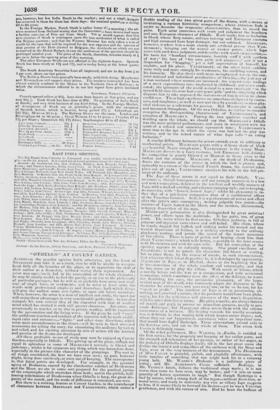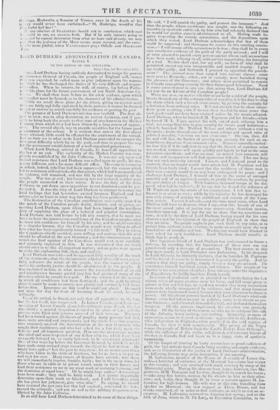"OTHELLO" AT COVENT GARDEN.
A 1.1110VGII the milder opinion Wits otherwise, yet the lover of SUM:MI:RE may take it as it truth, that he will be unable to compre- hend fully all the beauties of the plays, or to appreciate the skill of their author as a dratnetist, without seeing them represented. An actor may egre;jously fail in his conception of the whole character ; he may be totally unable to feel the poetry, or to rise to the philosophy of particular passages; but be will mast probably have soon, new read- ings of single lines, or sentiments, and be must at least utter the words with professional emphasis and discretion; both whitsh things will give the auditor some new lights, or open out latent meanings. When, however, the actor is a inan of intellect and study, the spectitor will enjoy these advantages in very considerable perfection : he can also compare his own critical idea of the character with that of smother mind which has studied it with still greater closeness. Attention, apt occasionally to wander, or to slur in primate reading, will be impre,sed by the personation and the living voice. If the piece be well "ca,t," the artful construction and conduct of the narrative will be made nisi/de; rapid exits and entrances-" fights" and other stage directions, which seem mere encumbrances in the closet-will be seen in their uses and necessities for telling the story, for stimulating the audience by variety and relief, and for exciting attention by arts of action till the interest and passion of the drama are developed.
All these profitable !Deana of study may now be enjoyed ay Covent Garden, especially in Othello. The getting.up of the piece, though not equal in splendour to some of Meciteeov's revivals, is liberal and judicious ; whilst it far surpasses any thing which was heretofore done, especially in the picture-like character of the groupings. The cast .s, all things considered, the best we have ever seen ; no part, however slight, being done carelessly, or even out of keeping. The consequence
is, that latent points are developed. For example, in the parental agony of Brabantio, caused by the clandestine conduct of Desdemona and the Moor, we are in some sort prepared for the poetical justice of the catastrophe which overtakes them both; and in the girlish, half- teasing solicitations of Desdemona when Othello is busy, the great dis- parity of the match, and the seeds of difference it contained, are seen.
But there is a striking feature at Covent Garden, in the interchange of characters between MACREADY and VANDENHOFF, which unites d. ouble reading of the two greed parts of the drama, with a means of instituting a curious histrionic comparison ; where criticism finds it easier to describe the respective characterieties, than to nwerd the palm. Each actor conceives with truth end judgment the Suuthera and non- European character of Othello. Each marks him as barbarian in blood, whose fiery nature, military training and European customs
and high command have kept dormant. but not %Adm.& eteteeno,
however, renders him a more stately and 11 r, it'ii'iul peto ii than VAN.. DENHOFF ; bringing out the worser or weaker points, as fuels hp notes with such keen judgment, and describes with nitwit exaggeration,- his taste for " bombast circuinstance, horribly stuff et with epithets of war ;" his love of " his omit pride and put pes;" and it not a disposition for " bragging," yet a full appreciation (it him-elf, his exploits, and his place. VANDENHOFF, oti the oteer hand, exhibits Inure truly and more strongly hie tetidertiess, his confiding nature, and his humanity. He also shows with more metaphysival eicely, the cone joint national and individual peculiarities of Otriellie-the jeali nil of a matt nurtured whet e women are immured ; the superstitiinis feelings of a most superstitious race, implanted in childhood, and neVer eradi- cated; the ignorance of the world, ii aural to a man employ ed '• in the tented field since hie arms bad ',even years' pith," and the simplieity which disposes him tel take unproved the statements of him in it how lie places confidence. These high excellencies are sometimes disfigin ell fly coarse- ness, and roughness; as well as itow and then by a tendeeey to mere phy- sical violence as a substitute for passion. But AlACIWADY is stii0Ofh and measured throughout. Of the too Othellos, we incline to consider conception the distiuguishing characteristic of' VANDENDOWS, and execution of MACREADV.S. Putting the two qualities together and
deciding upon the whole, we should say that Maces:A oe's Othello
was the more artificial performance, and more in aceoromme with the spirit of a refined amid somewhat squeamish time ; Veer:le:sewer's more true to the age in which the scene was laid told the play was written, and to the naked nature of what Ingo calls " an erring barbarian."
A similar difference between the actors extends even to arbitrary or mechanical points. IllecueaDv paints with a delirate shade of black
• —a beautiful Negro complexion ; VANDENIIOFF is the tawny Moor. MACREADY dresses in a fancy costlittle, EUtOpCilti halt- Asiatic;
his competitor is purely Orientil or Moorish in dress, t ven to the
turban anti the eimitar. MACREADV, at the death of Desdemona, draws the curtains of the recese in which the bed is placed, and, agreeably to a cation of the classical French drama, the murder takes Place out of sight ; VANDENIIOFF smothers his wife in the full pre.. sence of the audience.
The logo of' these actors is not equal to their Othello. VAN- DEN110Ers, though homogeneous and not wrongly conceived, is a low
and ueder.conception, deficient in the intellect und worldly tuanners of Ingo, with a dash of eervility, and a favour.currying style, not in keeping, we conceive, with " honest, honest logo ;" whilst his pleasantry is ra- ther that of' a pot-house compimion than of a confidential officer of the Venetian General. Still, it is a performance of power and effect after the actor's owl. conception ; making palpable two points-the motives of Jago's hatred to the Aloor, and the restless, discontented, unhuppy disposition of' the mull.
MACREADY'S personation is ulso distinguished by great artistica]
power, mid effects upon the multitude. It has parts, too, of great
truth. The scene where he first excites Othello's jealousy, is full of
purpose and apparent earnestness and sell.belief. His close, where he stands, dogged, but baffled, end sinking under his wound and the
mental depression of failure, is a striking contrast to the ordinary playhouse reading., awl points the moral of the innate meanness of the villain. There is more of po'dell and bearing about hitu than about 1ANDEN1101T ; tells better, especially in the later scenes
with Destlemoms and with his own wife. But his conception iit the (penile; appears to us radically wrong. One grand excellence of SitAiiseritt-:, is not to parade his chelacters full. blown tit starting, but to place them, by the course of era:tits, in such circumstances,
that whatever their latent disposition is, it is developed by opportunity.
ACRE.% DY in Ingo, as in ninetieth, :shows at the beginning that he is tot e-conscious of the whole conduct end catastrophe, .and that
he has come on to play the villain. With much of' labour, which generilly brings out the text as a compesition, and with occasional mennerism. whiell sometimes mars the effect of the delivery, he wants the flexibility, the vase, the persuasive pleasantry, of the hypo- critical man of the %veld, who cautiously adapts his discourse to the character he encotintere, and uses every one, so far as he can, for his
" sport or profit." The intellect of Lego is of so penetruting, ob-
serving, ane practical a nature, that its products would have been philo- sophy, but fur the selli.liness and grossness of the disposition,
with his utter disbelief in virtue. His pithy remarks, are always thrown oil' readily end gayly to answer an immediate purpose, mostly to per- suade Roderigo : but MAL:BEADY often unit's them with the solemn
eareestness of a lecturer. His bearing towards his worthy associate, too, is deficient in that suavity with which knaves entice dupes; and, where they are not hypocritival, sometimes takes an imperious tone, that would have huflill Roderigo. These observations extend only to the first two :tete, and not to the whole of them. The scene with Cuesio is delicately comic. Of the other performers, Mrs. Wansten, in "Emilia, is entitled to the first notice, for the propriety and keeping of her earlier parts, and the strength and vehemence of her passion, or rather of her anger, as
the jealousy of Othello displays itself; till in the last great scene she divides the interest and sympathies of the audience with the Moor and
Iego, even at the very moinent of the denouement. The Desdeniona of Miss Faccie is graceful, girlish, and playfully affectionate, with little touches of something that one might look for in a runaway
young lady. Mr. WARDE'S Brabantio is a judicious piece of
acting; and Mr. ANDERSON'S Cassio sufficient. Roderigo, in
Mr. VINING'S hands, follows the traditional stage mode ; it is not worse than some we have seen, may be better ; and " it sets on some quantity of barren spectators to laugh." But though Roderigo is a fool by nature, with a strong dash of the rogue-without discretion, or
moral sense, and ready to undertake any vice or entity Iugo suggests to him, if it seems likely to forward his desires-yet he was a Venetian gentleman, and with the rcienue of one. Had he been the buffoon of
• - the stage, Brabantio, a Senator of Venice. even in the depth of his e•ery would never have exclaimed—" 0, Roderigo, would'st that hadst had her ! "
If any admirer of SHANSPERE should ask in conelusion. which cast melt to see, we answer, both. But if he only intends going to
and he cannot determine from what we have said already, we may
a.. e that the jealousy of the Moor seems more natural, and the came more pitiful, when VANDENHOFF plays Othello and MAcREADY
of:v.



























 Previous page
Previous page